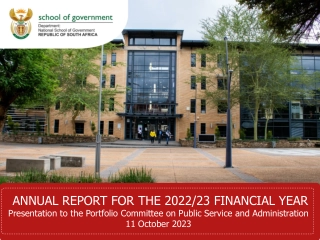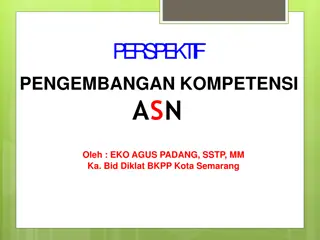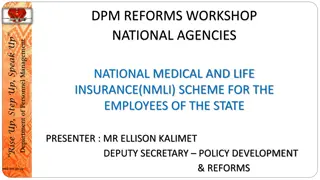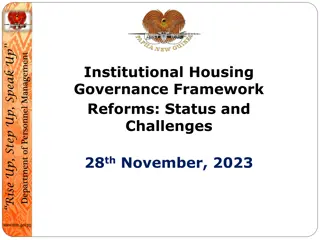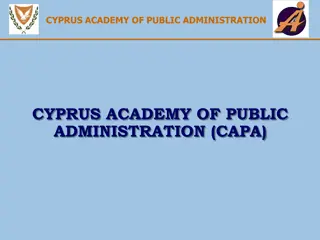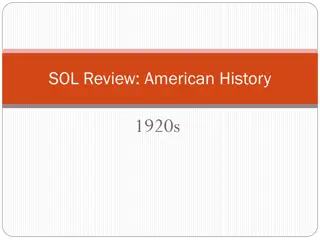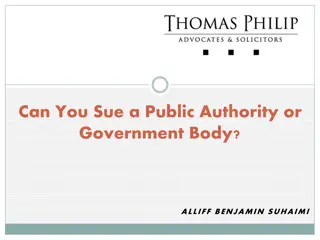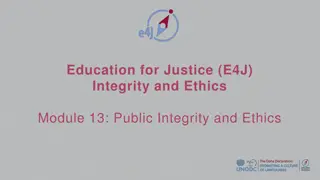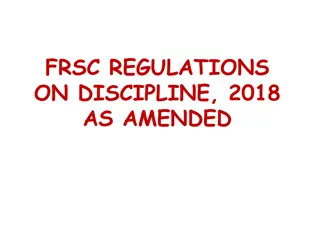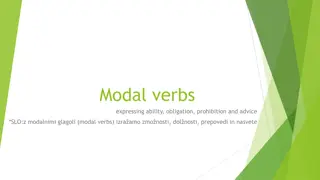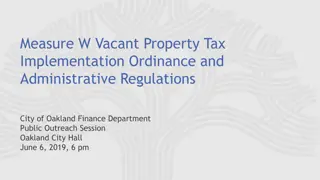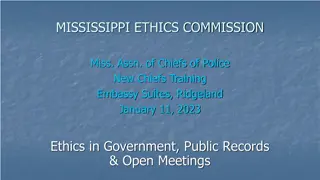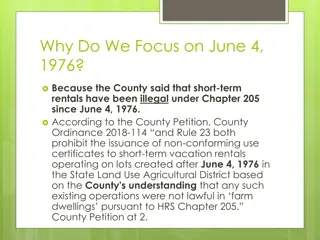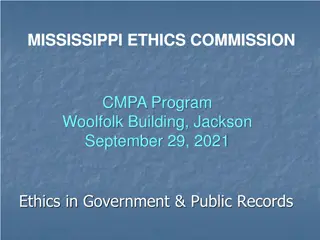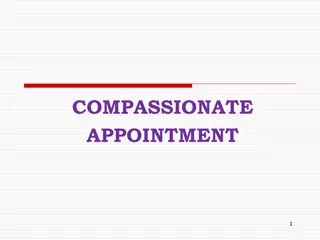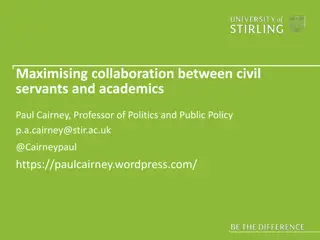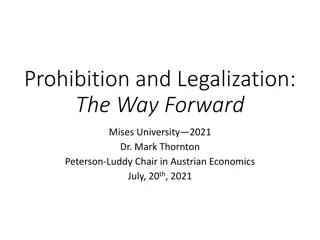Implementation of Public Servants Business Prohibition Regulations
The presentation outlines the purpose and background of the Revised Determination on Other Remunerative Work to prohibit public servants from conducting business with state organs. It highlights measures in place, statistics on employee compliance, progress reports provided by departments, and the regulations preventing employees from conducting business with the state. Violations of these regulations are considered offenses with potential fines or imprisonment. The aim is for the Portfolio Committee to monitor and note progress on the implementation of regulation 13(c) of the Public Service Regulations, 2016.
Download Presentation

Please find below an Image/Link to download the presentation.
The content on the website is provided AS IS for your information and personal use only. It may not be sold, licensed, or shared on other websites without obtaining consent from the author. Download presentation by click this link. If you encounter any issues during the download, it is possible that the publisher has removed the file from their server.
E N D
Presentation Transcript
The implementation of the Revised Determination on Other Remunerative Work to prohibit public servants from conducting business with an organ of state 1 DPSA 20 November 2019
Presentation Outline 2 Purpose Background Measures put in place Regulation 13 (c): Status as at April 2019 Conclusion Way forward
Purpose and Background 3 For Portfolio Committee to: Take note of progress on the implementation of regulation 13 (c) of the Public Service Regulations, 2016, which prohibits public service employees from conducting business with an organ of state.
Background 2 In Sept 2018, the DPSA presented to this Committee the following statistics: February 2017, National Treasury found 8 495 public service employees to be registered on the CSD: 5 366 from provinces and 3 129 from national departments. From the 8 495 public service employees listed, 580 employees were actually conducting business with an organ of state. At the end of March 2018, National Treasury found 15 070 public service employees to be registered on the CSD: 10 315 from provinces and 4 755 from national departments. From the 15 070 public service employees listed, 679 employees were actually conducting business with an organ of state (183 from national departments and 496 from provincial departments).
Background 3 The DPSA reported that 20 departments provided progress reports to the DPSA (10 provincial departments and 10 national departments) by end of August 2018, and a further 2 by September 2018. The Portfolio Committee requested the names of identified employees and their departments from the DPSA so as to address their non-compliance. This was provided in December 2018.
Measures put in place 6 PSR 13 (c) - An employee shall not conduct business with any organ of state or be a director of a public or private company conducting business with an organ of state, unless such employee is in an official capacity a director of a company listed in schedule 2 and 3 of the Public Finance Management Act
Measures put in place 7 Section 8, Public Administration Management Act, 2014 (2) An employee may not- (a) conduct business with the State; or (b) be a director of a public or private company conducting business with the State. (3) A contravention of subsection (2)- (a) is an offence, and any person found guilty of the offence is liable to a fine or imprisonment for a period not exceeding 5 years or both such fine and imprisonment; and (b) Constitute(s) serious misconduct which may result in the termination of employment by the employer.
Measures put in place 8 To assist with implementation, the MPSA approved two directives: Directive on Other Remunerative Work Outside the Employee s Employment in the Relevant Department as contemplated in Section 30 of the Public Service Act, 1994 (November 2016). This Directive introduced a standard process for Public Service employees when applying for other remunerative work. Directive on Conducting Business with an Organ of State (January 2017). This directive outlines what is meant with conducting business and provides a list of ten activities that are excluded from the definition, such as teaching activities. To undertake these excluded activities, a Public Service employee still has to apply for other remunerative work, to assess for possible conflict of interest.
Measures put in place 9 To monitor the implementation of regulation 13(c) and to provide support, the DPSA undertook the following: National Treasury started from 1 March 2017 to monitor all new registrations of public service employees on the online Central Supplier Database (CSD) system, by matching prospective suppliers against the Personnel Salary System (PERSAL system), using an identification number. When a match is obtained, the person is flagged and is then required to provide proof that he/she is not a public service employee, before registration continues. This database contains the names of all individuals and companies wishing to obtain government contracts. The PERSAL system was amended to capture the other remunerative work approval process so as to enable the DPSA to monitor applications which may involve the conducting of business with the State by comparing it with data contained on the electronic Financial Disclosure System (eDisclosure system) and the CSD.
Measures put in place 10 The DPSA continuously identified employees possibly conducting business with the State and communicated it to the relevant departments to take the necessary steps: 2017 In January, letters were forwarded to Executive Authorities, identifying officials registered on the CSD and those conducting business with the State. Heads had to take action against officials in line with transitional measures and create awareness on the regulation. A Circular was communicated in June 2017 to urge action and a progress report was presented to Cabinet in November 2017. 2018 In February, further letters were forwarded to Executive Authorities, identifying officials registered on the CSD and those conducting business with the State. Heads had to verify the presented information, and where necessary, take action against officials. MPSA requested feedback by 31 March 2018. In September a progress report was submitted to Cabinet. By September 2018, 22 departments reported to the DPSA.
Measures put in place 11 2018 continue In December, the DPSA provided the Portfolio Committee with the names of employees and departments possibly conducting business with the State. 2019 The DPSA started to verify the individuals on the lists, by personally contacting departments to assist with verifying if employees are still in service, and to confirm the allegation that the employees are conducting business with the State. Verification was considerably hampered by National Treasury s decision to deny DPSA access to the CSD data, because of POPIA concerns. This was resolved, but delayed the process significantly.
Regulation 13 (c): Status as at April 2019 12 As at the end of April 2019 (cumulative statistics from 2017): 17 700 Public Service employees were registered on the CSD (they were not conducting business, but are able to do so in future). 1 068 Public Service employees were conducting business with the State (798 from Provincial Departments, and 270 from National Departments). This increased from 2018, where only 15 070 were registered on the CSD and 679 were conducting business with the State. (Information matched between CSD and PERSAL)
Regulation 13 (c): Status as at April 2019 13 National Departments: 28 possibly have employees conducting business with an organ of state 16 have no employees conducting business with an organ of state Provincial Departments: KZN 13 possibly have employees conducting business with an organ of state 1 has no employees conducting business with an organ of state
Regulation 13 (c): Status as at April 2019 14 Provincial Departments: Gauteng 7 possibly have employees conducting business with an organ of state 7 has no employees conducting business with an organ of state North West 5 possibly have employees conducting business with an organ of state 7 have no employees conducting business with an organ of state
Regulation 13 (c): Status as at April 2019 15 Provincial Departments: Eastern Cape 10 possibly have employees conducting business with an organ of state 2 have no employees conducting business with an organ of state Limpopo 9 possibly have employees conducting business with an organ of state 3 has no employees conducting business with an organ of state
Regulation 13 (c): Status as at April 2019 16 Provincial Departments: Mpumalanga 8 possibly have employees conducting business with an organ of state 4 have no employees conducting business with an organ of state Free State 8 possibly have employees conducting business with an organ of state 4 have no employees conducting business with an organ of state
Regulation 13 (c): Status as at April 2019 17 Provincial Departments: Northern Cape 9 possibly have employees conducting business with an organ of state 3 have no employees conducting business with an organ of state Western Cape 4 possibly have employees conducting business with an organ of state 9 have no employees conducting business with an organ of state
Conclusion 18 To date, only 22 departments provided feedback to the DPSA Two indicated that they were compliant: The Department of Public Enterprises and the Department of Arts and Culture (which is still compliant), and 10 more Departments indicated they were reviewing the data submitted by the DPSA and undertaking investigations: DIRCO, Dept of Environmental Affairs, Dept of Water and Sanitation, DOJ &CD (including NPA), NSG, Kwa- Zulu Natal Dept of Education, Gauteng Dept for Human Settlements, Gauteng Dept for Social Development, Limpopo Dept for Public Works, Roads and Infrastructure, and Limpopo Dept for Cooperative Governance, Human Settlements and Traditional Affairs.
Conclusion 19 By 31 March 2018, morecorrespondences were received, where 8 more departments reported (Department of Telecommunication & Postal Services, Government Communication and Information System, Tourism, Trade and Industry, Science and Technology, DPSA, Eastern Cape Safety & Liaison and the Department of Human Settlement) and one asked for extension (Western Cape Provincial Department in July 2018 a comprehensive update was provided). Another two provided information at the end of September 2018: The Department of Human Settlement, Western Cape Provincial Department and Department of Health, Western Cape Government. Very few reported outcomes of investigations and informed employees registered on the CSD to deregister.
Way forward 20 From May 2019, the DPSA started to verify the identified names with their relevant departments, to ensure they are still employed, correctly flagged and conducting business with the State. Those confirmed will be handed (in batches) to the South African Police Service (SAPS) and National Prosecuting Authority (NPA) for investigation and prosecution. On 24 June 2019, the first 20 public service employees who are conducting business with the State were handed to the South African Police Service and the National Prosecuting Authority for further investigation and prosecution. On 2 September 2019, SAPS and the DPSA convened a meeting to discuss progress on these cases and it was resolved that the NPA will be included in the next meeting to develop prosecution strategies. The DPSA is also in the process to finalise another 20 names of employees to be handed to the SAPS before the end of November 2019.
21 END


